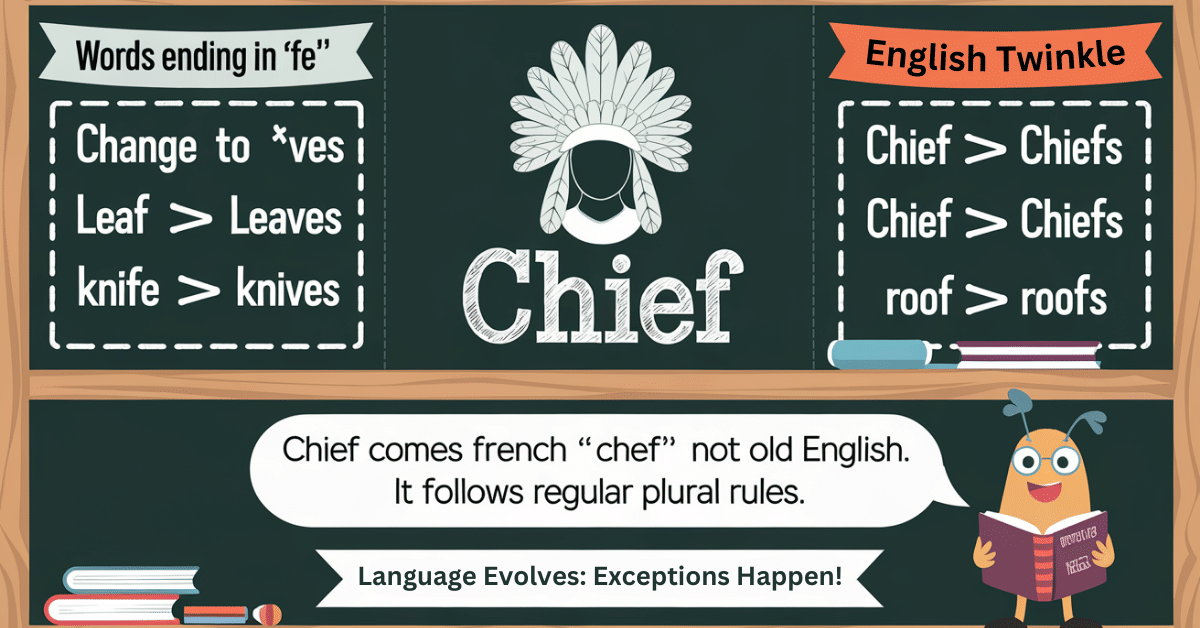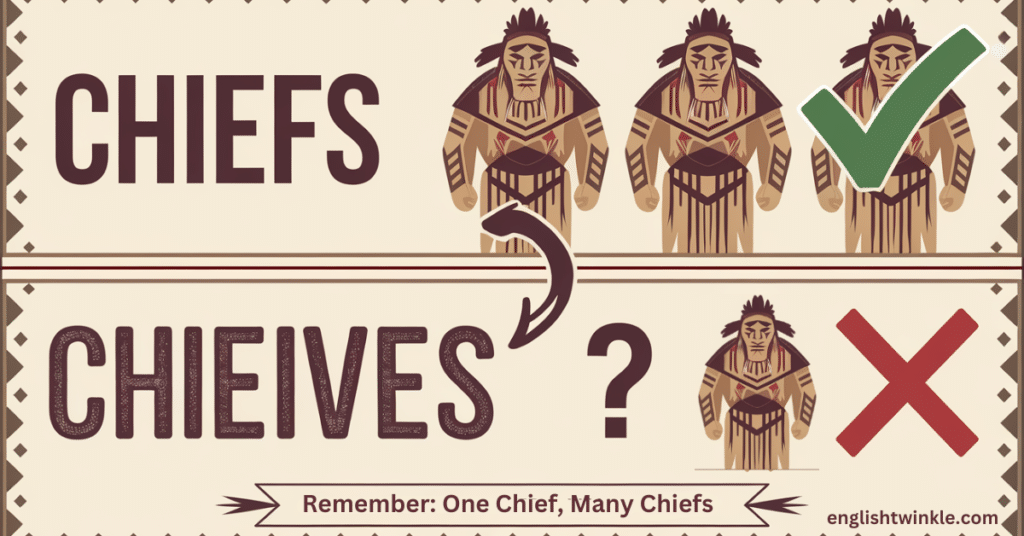The English language has its quirks, and one area that often causes confusion is pluralization. A common question that arises is: what is the plural of chief? Is it chiefs or chieves? Given that similar words like “thief” become “thieves,” it’s understandable why people might think the plural of chief could be chieves. However, the correct plural form is chiefs.
In this blog post, we’ll explore the meaning of “chief,” explain why chiefs is the correct plural, delve into the word’s origins, look at common synonyms, and put your knowledge to the test with a quiz. By the end, you’ll be confident in your understanding of chief and its plural form.
What Does “Chief” Mean?
At its core, chief refers to a leader or head of a group or organization. The word can be used both as a noun and an adjective, depending on the context.
| Word | Part of Speech | Meaning |
|---|---|---|
| Chief | Noun | A leader or head of an organization, group, or tribe. |
| Chief | Adjective | Highest in rank or authority, or most important. |
Usage in Sentences:
- Noun: “The tribal chief made an important decision.”
- Adjective: “The chief concern was about the new policy changes.”
As a noun, chief is often used in titles such as Chief Executive Officer (CEO) or tribal chief. As an adjective, it highlights something or someone of primary importance, such as a chief concern or chief priority.
Singular and Plural Forms of “Chief”
The singular form of the word is chief, but what happens when you need to refer to more than one leader? The correct plural form is chiefs.
Plural Form of Chief = Chiefs
The plural of chief is chiefs, following the regular English rule of adding -s to form the plural of most nouns. This differs from irregular nouns like thief, which becomes thieves.
Why Isn’t It “Chieves”?
It’s easy to understand why some might think the plural of chief could be chieves, given that many words ending in -f (like thief) form their plurals by changing -f to -ves. However, chief follows a different pluralization pattern. Let’s compare these patterns:
| Singular | Plural | Pattern |
|---|---|---|
| Chief | Chiefs | Just add -s |
| Thief | Thieves | Replace -f with -ves |
| Cliff | Cliffs | Just add -s |
| Leaf | Leaves | Replace -f with -ves |
As you can see, chief doesn’t follow the same pattern as words like thief and leaf. Instead, it adds -s to form the plural, just like many other English words.
Why the Plural of “Chief” is “Chiefs” and Not “Chieves”

The confusion over chiefs vs. chieves comes from the irregular pluralization rule that applies to some words ending in -f or -fe. However, chief doesn’t follow this rule for several reasons:
Different Linguistic Roots
The word chief comes from the Old French word chef, which means “leader” or “head.” On the other hand, words like thief and leaf have Germanic origins, which explains why their plural forms are irregular, taking the -ves ending.
The “Sibilant” Rule Doesn’t Apply
In English, words that end in sibilant sounds (like -s, -sh, -ch, -x) usually add -es to form the plural (e.g., wish → wishes, box → boxes). However, since chief doesn’t end in a sibilant sound, it doesn’t follow this rule either. It simply adds -s to form the plural.
Singular and Plural Usage in Sentences
Now that we know the correct plural form of chief, let’s look at how the word is used in both singular and plural contexts:
Singular Usage:
- “The chief of police gave a press conference.”
- “The chief architect designed the building.”
- “The chief of the tribe welcomed the visitors.”
Plural Usage:
- “The chiefs of several indigenous tribes met to discuss the treaty.”
- “The chiefs of the company departments gathered for a meeting.”
- “The chiefs of different organizations collaborated on the new initiative.”
The Origin of “Chief”
The word chief has an interesting origin rooted in the languages of Europe. It comes from the Old French word chef, meaning “leader” or “head,” which itself derived from the Latin word caput, meaning “head.” This etymology explains why chief is associated with leadership and authority.
A Timeline of the Word’s Evolution:
| Language | Word | Meaning |
|---|---|---|
| Latin | Caput | Head |
| Old French | Chef | Leader or head |
| Middle English | Chief | Leader, principal |
As English evolved, many words from Old French, especially those related to leadership and governance, were adopted into the language. Chief is one of those words, and its meaning has remained consistent over time.
Synonyms for “Chief”
Sometimes, it’s helpful to use synonyms for variety or to emphasize different aspects of leadership. Here are some common synonyms for chief, along with their meanings:
| Synonym | Meaning |
|---|---|
| Leader | Someone who directs or commands a group. |
| Head | The person in charge or in the top position. |
| Boss | Informal term for someone with authority, typically in a workplace. |
| Principal | The main person responsible, often used in schools or projects. |
| Captain | The leader of a team or ship. |
| Director | A person who manages or oversees an organization or department. |
| Commander | A military leader who holds a position of authority. |
| Supervisor | Someone who watches over and directs the work of others. |
Example Sentences Using Synonyms:
- As the leader of the group, she made the final decision.
- The department head called a meeting to discuss the new strategy.
- The ship’s captain guided the crew through rough waters.
Test Your Knowledge: Quiz on Plurals and Usage
Time to test your understanding of the pluralization rules and usage of chief! Try out the following quiz to see how much you’ve learned.
Quiz:
- What is the correct plural form of chief?
- a) Chieves
- b) Chiefs
- c) Chiefes
- In which sentence is chiefs used correctly?
- a) The chiefs of the companies is meeting today.
- b) The chiefs of several tribes gathered to discuss the treaty.
- c) The chieves are in charge of the project.
- Which word does not follow the -ves plural rule?
- a) Thief
- b) Leaf
- c) Chief
- What is the origin of the word chief?
- a) Old French
- b) Germanic
- c) Greek
Answers:
- b) Chiefs – The correct plural form of chief is chiefs, following the regular pluralization rule of adding -s.
- b) The chiefs of several tribes gathered to discuss the treaty. – This sentence correctly uses chiefs in the plural form.
- c) Chief – Chief follows the regular -s plural rule, unlike thief and leaf.
- a) Old French – Chief comes from the Old French word chef, meaning “leader” or “head.”
Conclusion
To sum it up, the correct plural of chief is chiefs—not chieves. While it’s easy to confuse the plural of chief with other words like thief (which becomes thieves), chief follows the standard pluralization rule of adding -s. This difference can be traced back to the word’s origin in Old French, which is distinct from the Germanic roots of words like thief and leaf.
Whether you’re referring to corporate chiefs or tribal chiefs, now you can confidently use the correct plural form. English may have its challenges, but once you understand the underlying rules and patterns, things start to make sense.
Lastly, don’t forget to use synonyms like leader, head, or boss when you want to add variety to your language. Now that you’ve got a solid understanding, go forth and use the word chief like a pro!

